The internet is chock full of articles telling you how you can “hack” your brain, or unlock your mind with one or two simple tricks, and suddenly be like a savant character from a movie. These articles do most people a disservice as they dangle a shiny object in front of them that sounds really cool, but they leave out a lot of important details. You can make yourself smarter, and teach yourself ways to be like a human calculator, or greatly improve your memory, but these require hard work and practice. Like any skill, you can get the basics fairly quickly, but truly becoming an efficient machine at anything and achieving mastery will take a lot of time.
10. A Surprising Amount Of People Still Think They Can “Unlock” Their Mind

One of the most enduring myths about the human brain is that we are really only using 10% of it, and that if we could just unlock that other 90%, we would turn into some kind of ridiculously powerful superhuman psychic beings. However, while more and more people are starting to learn that this is total nonsense — your brain is using all of itself basically all the time to control all of your body’s functions, often without you realizing — there is still a similar mythology that exists in many people’s minds.
When you read about people telling you how to meditate, or learn some new trick to improve your memory or overall brain power, they will still often couch things in terms of “unlocking” your potential, or using our full abilities. The fact of the matter is that this is just a complete and total misunderstanding of science and makes people think things are going to be much, much easier than they actually are. It does not help that articles about this type of thing usually call them techniques or tricks, when really they could be described more accurately as hobbies or disciplines. You don’t just pick them up and know them to completion right away.
9. There Are No Quick Or Easy Ways To Shortcut Yourself To Genius

As we mentioned in the previous entry, many people are convinced that they simply need to unlock something that was there all along. They believe that if they just do the right trick, or tap into the right thing, their brain will open up like Neo in The Matrix. Now, it is true that your brain is capable of so much more than it is now, but not by doing the mental equivalent of waving a magic wand. Brains have something called neuroplasticity, which essentially means that over time, the brain actually can increase the amount of neurons and connections — basically meaning you are becoming not just more knowledgeable, but smarter and more capable over time.
To truly have a lasting, long term effect, it will take a lot of work and repetition of the same patterns. The tricks that you see on most sites for improving your memory (or other such things) do work, but to use them effectively and see a long term spike in your brain’s ability to process and store memory subconsciously, you are going to have to keep at it in a dedicated way for quite some time. The improvement of one’s memory is not like learning a card trick, but more like learning about playing cards when you have never seen them before in your life — if you want to make a big difference, you have a lot of work to do and it will take time.
8. Like Any Skill, Brain Hacks Can Be Learned And They Can Atrophy Over Time

Riding a bike is a difficult skill to learn, but they say that once you learn it, you will never forget it. Now, while this may be true to a certain extent, it doesn’t change the fact that not riding your bike for many, many years, is still going to greatly decrease the skill level that you once had, and it will be some time before you are back to the peak performance you once had, even if you are in good physical shape otherwise. Brain hacks can be somewhat similar — if you learned them extremely well in the first place and had a strong foundation, it will be easy to relearn them, but you will still have lost a lot of your edge.
Learning any kind of memory pattern or technique to improve your cognitive abilities will increase the neuron connections in your brain, but you can also atrophy over time and lose some of that power if you don’t continue to at least maintain that skill. Many people want quick hacks or easy answers, but the best way to being a fast-thinking genius who people mistake for a computer is constant hard work and dedication.
7. Learning A Language Is One Of The Best, And Most Overlooked Methods

The jury has been out for some time now on this one, but it is still probably the most overlooked of all. The fact of the matter is that learning another language, or languages, makes you smarter and also helps protect you from dementia in your old age. When you think about it, learning a new language exposes you to so many new patterns that your brain has to be creating all kinds of new connections. However, on top of that, learning a new language gives us an opportunity to create pathways that others from our culture may always lack, and allows us to think in an entirely different way.
Language affects everything about us far more than most people ever imagine. For example, the aboriginals and some others use cardinal directions (such as North, or South) for any concept involving distance and don’t really have words for things like left or right — they are not capable of seeing the world the way we do, but they also see it in ways we can’t. By learning more languages, you are strengthening your neural pathways, and giving your brain the ability to see the world in all kinds of new perspectives that your first language did not give you the capability to see.
6. Sleep Learning Can Work, But Only In A Very Limited Way And For Certain Things
https://www.youtube.com/watch?v=fNHZynAB5Xg
One of the classic lazy favorites is the plot often seen in movies or TV that you can use some kind of CD — whether hypnotic or otherwise — to learn while you sleep, and bypass all that painful studying and working and effort. Some media have used this to make fun of the person trying to do it, and others have made it look like a more serious method. Now, there is a small amount of truth to the idea, but it is far less powerful than most people think. To begin with, hypnosis itself only works if you really want it to, and doesn’t really do much even then — it is really only self suggestion by definition anyway. However, whether using hypnosis or not, the whole thing is kind of exaggerated.
Studies have shown that sleep learning can work on a very limited basis, but it cannot teach you something you don’t know, and it isn’t particularly good at anything even slightly complicated. The findings were that people who listened to music or listened to vocabulary words that they were already learning found it easier to remember them the next day if they listened to them while falling asleep. The key here is that none of the information was actually learned while sleeping, but was previous information being reinforced through memory. This means you would have success falling asleep to a CD of vocabulary words you were learning, but if you haven’t heard those words before you put on the CD, you are likely wasting your time when you could just listen to some relaxing music instead.
5. There Is No Substitute For A Strong Foundation In Mathematics

Another way you will hear people suggest hacking your brain is by learning all kinds of “math magic” tricks. You may have seen people like this if you have ever been to Vegas. They can calculate ridiculous numbers, before you can enter them properly into a calculator. Many people would think they are completely superhuman, but what they are doing is absurdly simple — although it still requires a lot of training — and most people with a math degree could pull off similar parlor tricks to varying degrees of success.
In fact, if you want to learn math magic tricks to impress your friends, or even improve your brain’s own ability to process numbers — or maybe you just think it would be cool to be a human calculator — you should really brush up on the foundation of your arithmetic first, and then math. All of the tricks they are doing are predicated on understanding all of the different times tables, as well as memorizing different important square roots, and other such basic functions. Their ability is simply a combination of knowing all that stuff you hated being forced to learn in grade school, and applying it in a really, really clever way.
4. There Is Also Really No Substitute At All For A Good Night’s Sleep And Never Will Be

One of the favorite “hacks” you will see floating around the internet until the inevitable heat death of the universe is the constant parade of tricks on how you can get a good night’s sleep in just a few hours, or a couple hours, or even thirty minutes. The suggestions are all over the place, and they all use dubious methods that basically involve trying to get a whole bunch of REM sleep packed into a really, really short amount of time. However, for starters, most of these methods are almost 100% impractical.
They rely on an amount of planning or scheduling that is simply not feasible, or ask you to do things that just aren’t possible. They will suggest you get up after almost exactly a certain amount of time, but even if you are the type to just zonk out, it would be very hard to know with precision when you actually fell asleep without advanced equipment that you wouldn’t have at home. Most people also would find it inconvenient to fit in some methods out there, which expect you to fit certain smaller blocks of sleep in like clockwork, despite how hectic most people’s schedules are even without that kind of complication.
Practicality aside though, the bigger issue is that none of this is a long term solution for not getting enough proper sleep. Just because REM is the most restorative doesn’t mean the other parts are not important. Even if you could just get enough REM sleep, you would almost certainly be missing out on the rest of the process, which is all part of how our brain has evolved to keep us healthy and working properly. If you really want your brain and body to function at their best level for a long term basis, you should do your best to get them good sleep on a regular basis. There is simply no real substitute.
3. In A Way You Are Constantly Hacking Your Brain, It Just Doesn’t Feel Exciting

Now, this may be obvious to some of you, but even those of you who don’t think you have any special skills are actually hacking your brain all the time and you have no idea you are doing it at all. Anytime you learn anything new, even if it is just some fandom you are passionate about, you are creating new memories and your brain’s power is expanding. And even if it is just discussing the plot of your favorite TV show, that critical analysis is expanding your ability to think and creating new neural pathways.
It may be a slow process that you cannot notice, but your dedication to your favorite intellectual pursuits, even if most people would consider them vapid or fairly non-interactive beyond consumption, make you smarter just by making those new memories and spending time actively thinking about something and how it would or does work. Radiation may not give us superpowers, but just by constantly learning new skills or improving the ones we have, we are taking small step after small step toward becoming more and more superhuman. And the truth is this is the case with any trick, as well, that you use to increase your brain power; it may not seem like much is happening at first, but every attempt to improve yourself makes you stronger. Just like lifting weights, the effects may not be that noticeable for some time, but one day it will be very clear that you have made some demonstrable progress, if you just keep at it.
2. Nearly Everything People Think They Know About IQs Is Mistaken Or Controversial

IQs, or “Intelligence Quotients,” are one of the most controversial things within the scientific community and especially within the psychological community, who often uses the tests for various reasons. The first major problem is that even among those who want a simple intelligence quotient test, there is no one official, government accepted test even within the United States of America. Obviously a worldwide test would be impossible to design, as language changes the way we think, as do so many other experiences in life and how we grow up.
And that, in a nutshell, is the big issue with IQ tests in the first place. Some psychologists think the ones we have are decent, but many believe what we have is simply a necessary evil. In other words, they feel that sometimes you do need a standardized test for various different reasons, but that the ones we have are simply not anywhere close to where they should be. Part of the biggest issue here is simply how you define intelligence.
As we are defining it here, learning or becoming better at anything is making you more intelligent at that particular thing — which is a form of making yourself smarter. However, a standardized test doesn’t account for every skill or set of skills needed or used in the world. On top of that, many people believe that an IQ is a set thing, but as we have been saying, you are constantly increasing your own intelligence every time you learn something new or get a little better at an old skill. Your IQ is not a static thing to begin with, even when it comes to the factors it does test for, but something that changes over time based on what you learn and how you progress as a person.
1. Some People Think They Can Be Everything, But Mastering Anything Takes Countless Hours

Lists about how you can hack your brain into awesomeness are one of the most popular things on the internet, and people especially love the “tricks” where it looks like you can just pick them up in an afternoon and turn into the computer who wore tennis shoes (it’s an old movie, guys) and dazzle the world and yourself with your amazing skills. However, even the most simple memory tricks are simply not something you can expect to become an expert at overnight. Now, this isn’t meant to discourage you, but to actually help you avoid quitting due to discouragement. Many people read various different tricks online for how to improve cognitive abilities, and they try them out and then give up on them when they don’t see any demonstrable results.
If you are actually interested in the end result, and you really do like the method you found, then you should stick with it. For some time the claim was that it took about 10,000 hours to become a true master of something. Now, this was only ever meant to be an estimate and has been confused by journalists as being a hard and fast rule, but it was based on a study that showed that thousands of hours of practice could bring out incredible skill in someone who wasn’t known to have any particular innate “talent.” The point of the study was that more than anything, dedicated practice, not innate ability, was what made you good at something.
Now, this doesn’t mean that you cannot become proficient at something fairly quickly, or reasonably good at something in a much smaller amount of time, but you cannot expect to be the master of every brain hack out there over the weekend. It is more likely you will find yourself able to become decent at a lot, or the master of just a few. Either way, if you really want to improve yourself and become a smarter, almost superhuman, the best thing to do is find a method you like to improve your cognitive abilities, and keep at it on a regular basis.